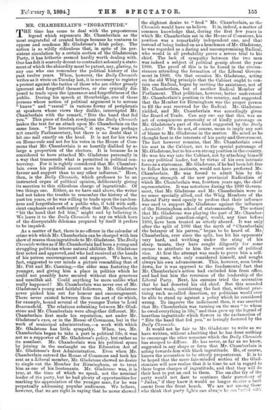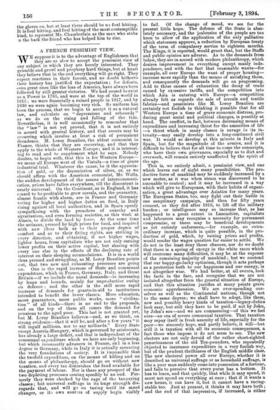MR. CHAMBERLAIN'S "INGRATITUDE." T HE time has come to deal with
the preposterous legend which represents Mr. Chamberlain as the most ungrateful of created beings because he ventures to oppose and. condemn Mr. Gladstone's Irish policy. The notion is so wildly ridiculous that, in spite of its per- sistent circulation by a certain section of the Gladstonian Party, it has hitherto seemed hardly worth dealing with. One has felt it scarcely decent to contradict solemnly a state- ment of which the absurdity must be patent, nay, glaring, to any one whe can remember the political history of the past twelve years. When, however, the Daily Chronicle writes as it wrote on Tuesday last, it is necessary to register a protest against the tactics of those who are either grossly ignorant and forgetful themselves, or else cynically dis- posed to trade upon the ignorance and forgetfulness of the public. During his speech at Stourbridge, one of those persons whose notion of political argument is to scream " knave " and "rascal" in various forms of periphrasis at speakers whose views they dislike, interrupted Mr. Chamberlain with the remark, "Bite the hand that fed you." This piece of foolish rowdyism the Daily Chronicle makes the text for an attack upon Mr. Chamberlain on the same lines. "The interruption," it says, "was perhaps not exactly Parliamentary, but there is no doubt that it hit one nail exactly on the head. It is not for his views on Home-rule and not for his votes in the House of Com- mons that Mr. Chamberlain is so heartily disliked by so large a proportion of the electors. It is because he is considered to have attacked Mr. Gladstone personally in a way that transcends what is permitted in political con- troversy. For it is rightly considered that Mr. Chamber- lain owes his political ascent more to Mr. Gladstone's favour and support than to any other influence." Here, then, is the Daily Chronicle, which professes to be an instructed organ of political opinion, deliberately giving its sanction to this ridiculous charge of ingratitude. Of two things one. Either, as we have said above, the writer had not taken the trouble to remember the history of the past ten years, or he was willing to trade upon the careless- ness and forgetfulness of a public who, if told with suffi- cient emphasis and sufficiently often that Mr. Chamberlain "bit the hand. that fed him," might end by believing it. We leave it to the Daily Chronicle to say on which horn of the disreputable dilemma prepared by itself it prefers to be impaled.
As a matter of fact, there is no offence in the calendar of crime with which Mr. Chamberlain can be charged with less show of reason than ingratitude to Mr. Gladstone. TheDai/y Chronicle writes as if Mr. Chamberlain had been a young and struggling politician whose natural abilities Mr. Gladstone first noted and approved,and who had received at the hands of his patron encouragement and support. We have, in fact, suggested to our minds a picture resembling that of Mr. Pitt and Mr. Canning,—the older man fostering the younger, and giving him a place in politics which he could not possibly have secured without this generous and unselfish aid. Could. anything be more unlike what really happened? Mr. Chamberlain was never one of Mr. Gladstone's young and faithful followers. Mr. Gladstone never picked him out for honour and encouragement. There never existed between them the sort of tie which, for example, bound. several of the younger Tories to Lord Beaconsfield. The relations subsisting between Mr. Glad- stone and Mr. Chamberlain were altogether different. Mr. Chamberlain first made his reputation, not under Mr. Gladstone's eyes, or in the House of Commons, but in the work of municipal administration,—a work with which Mr. Gladstone has little sympathy. When. too, Mr. Chamberlain began to take a part in political life, it was not as a. supporter of Mr. Gladstone's policy, but rather as its assailant. Mr. Chamberlain won his political spurs by joining in the onslaught on the Education Act of Mr. Gladstone's first Administration. Even when Mr. Chamberlain entered the House of Commons and. took his seat as a Liberal member' Mr. Gladstone showed no desire to single out the Member for Birmingham, or to treat him as one of his lieutenants. Mr. Gladstone was, it is true, at the time of which we speak, not the nominal leader of the party, but he had plenty of opportunities for marking his appreciation of the younger man, for he was perpetually addressing popular audiences. We believe, however, that we are right in saying that he never showed the slightest desire to "feed." Mr. Chamberlain, as the Chronicle would have us believe. It is, indeed, a matter of common knowledge that, during the first few years in which Mr. Chamberlain sat in the House of Commons, his position was a remarkably independent one, and that instead of being looked on as a henchman of Mr. Gladstone, he was regarded as a daring and uncompromising Radical, who would in all probability prove a severe trial to his chief. The lack of sympathy between the two men was indeed a subject of political gossip about the year 1880. The proof of this is to be found in the circum- stances attending the formation of the Liberal Govern- ment in 1880. On that occasion Mr. Gladstone, acting on the old Whig principle that the Cabinet ought to con- tain one Radical, began by inviting the assistance, not of Mr. Chamberlain, but of another Radical Member of Parliament. That politician, however, better understood. Mr. Chamberlain's position in the country, and. suggested that the Member for Birmingham was the proper person to fill the seat reserved. for the Radical. Mr. Gladstone yielded, and Mr. Chamberlain was accordingly given the Board of Trade. Can any one say that this: was an act of conspicuous generosity or of kindly patronage on Mr. Gladstone's part of the kind suggested by the Daily ....hronicle? We do not, of course, mean to imply any sort of blame to Mr. Gladstone in the matter. He acted. as he thought best in the interests of his party and Government. The fact however remains, that Mr. Chamberlain owed his seat in the Cabinet, not to the special patronage of Mr. Gladstone, but to his own strong position in the country. He won his way into the Cabinet, not by attaching himself to any political leader, but by virtue of his own intrinsic force as a statesman. Mr. Gladstone, if he had been left free to follow his own instincts, would. not have preferred Mr. Chamberlain. He was forced to admit him by the growing strength of the new provincial Radicalism of which Mr. Chamberlain was, fourteen years ago, the chief representative. It was notorious during the 1880 Govern- ment, that Mr. Gladstone and. Mr. Chamberlain were in no sense specially allied, and the Whig Members of the Liberal Party used. openly to profess that their influence was used to support Mr. Gladstone against the influence of the Birmingham school of statesmanship. The notion that Mr. Gladstone was playing the part of Mr. Chamber- lain's political guardian-angel, would, any time before 1886, have been treated as utterly absurd. It was only after the split of 1886 that the myth of "Chamberlain the betrayer of his patron," began to be heard of. Mr. Chamberlain, ever since the split, has hit his opponents very hard, and writhing under the sting of his sharp taunts, they have sought diligently for some excuse to attribute to him the worst sorts of political vice. At first the attempt was made to prove him a self- seeking man, who only considered himself, and. sought always his own advancement. This, however, soon broke down, for it was opposed to the fundamental fact that Mr. Chamberlain's action had. excluded him from office, and had lost him the reversion of the leadership of the Liberal Party. Next, his enemies tried the accusation that he had deserted his old chief. But this sounded somewhat weak, considering the fact that, without prac- tising such so-called. desertion, no politician would ever be able to stand up against a policy which he considered wrong. To improve the indictment then, it was asserted that Mr. Chamberlain was turning on the man "to whom he owed everything in life," and thus grew up the legend of heartless ingratitude which flowers in the exclamation of "Bite the hand that fed you," so lovingly fostered by the Daily Chronicle. It would not be fair to Mr. Gladstone to write as we have written, without admitting that he has done nothing to encourage the utter nonsense which the Daily Chronicle has stooped to diffuse. He has never, as far as we know, suggested in any shape or form that Mr. Chamberlain is acting towards him with black ingratitude. He, of course, knows the accusation to be utterly preposterous. It is to be hoped that the more fair-minded section of the Glad- stonians will now realise that it is time to act in regard to these bogus charges of ingratitude, and. that they will do their best to put an end to them. The smaller fry of the party would not dare to continue their parrot-cry of "Judas," if they knew it would no longer receive a, tacit assent from the front bench. We are not among those who think that party- fie,,hts can alwa:s be con Noted with, the gloves on, but at least there should be no foul hitting. It is foul hitting, and foul hitting of the most contemptible kind, to represent Mr. Chamberlain as the man who stabs n the back the friend who has helped him to rise.



































 Previous page
Previous page